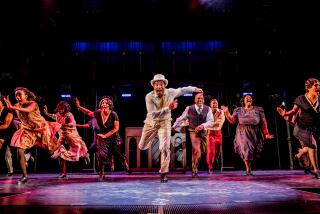For Mike Stoller, ‘Smokey Joe’s Cafe’ has come home

This post has been updated. See note below for details.
As a rule, composers of musicals are happy about any productions anywhere of their work.
But Mike Stoller, the surviving half of the fabled songwriting team of Leiber and Stoller, is particularly excited about the Pasadena Playhouse’s impending revival of “Smokey Joe’s Café,” the jukebox musical built around more than three dozen of the signature hits he and longtime partner Jerry Leiber cranked out in the 1950s and 1960s.
First, there’s the hometown aspect: The Pasadena Playhouse production, which opened this week, is just a few miles away from where they met in 1950, when Stoller was student at L.A. City College and Leiber was in his senior year at Fairfax High School. Their friendship evolved into an astoundingly successful creative partnership that continued for 61 years, until Leiber’s death in 2011.
In addition, there’s Stoller’s personal affection for the Pasadena Playhouse, a theater he and his wife, pianist-harpist Corky Hale Stoller, grew so fond of that they plunked down a cool $1-million donation. By putting up the money as a challenge grant, it yielded the $2 million that was key to pulling it out of its financial straits.
PHOTOS: Arts and culture in pictures by The Times
“This production of ‘Smokey Joe’s Café’ and our interest in the theater are mutually exclusive,” said Stoller, 80. “We are hoping ‘Smokey Joe’s Café’ will have long runs in lots of places, and we’re also hoping that the Pasadena Playhouse, which is a wonderful theater that started so long ago, is also going to have a long, long run — hopefully a permanent run, because they do great work.”
“Smokey Joe’s Café” might be considered the godfather of the jukebox pop musical, a compendium of hit songs that Leiber and Stoller wrote for Elvis Presley, the Drifters, the Coasters, Ben E. King, Big Mama Thornton and numerous other early rock and R&B stars. Among those classics that earned the pair a place in the Rock and Roll Hall of Fame: “Hound Dog,” “Jailhouse Rock,” “Yakety Yak,” “Charlie Brown,” “Kansas City,” “There Goes My Baby,” “Stand By Me.”
After getting off the ground in Los Angeles in the early 1990s, “Smokey Joe’s Café” opened on Broadway in 1995 and ran for more than five years, tallying more than 2,000 performances and becoming the most successful musical revue in Broadway history. It has since played extensively in London and in smaller productions across the U.S.
The Leiber and Stoller songs are the alpha and omega of “Smokey Joe’s Café,” which dispenses with any attempt at linking the songs through dramatic narrative.
CHEAT SHEET: Fall arts preview
Having come away dissatisfied from at least three earlier attempts to weave songs from their extensive catalog into a theatrical show, Stoller said he called Broadway producer Jack Viertel, with whom he and Leiber had been throwing around ideas about a ballet musical, and said, “Listen, let’s get rid of the book — let’s just do the songs and forget the book. And they agreed.
“Another aspect is that so many of the songs are little stories in and unto themselves,” he said. “So they won’t fit into larger stories, because they are stories, separate, individual stories. I guess that was why it worked.”
The Pasadena Playhouse production is directed and choreographed by Jeffrey Polk, who has a track record with Leiber and Stoller’s show.
“Jeffrey did this a few years ago on a very limited engagement in North Hollywood at the El Portal,” Stoller said. “It was sensational. They would have extended it, but all the actors had taken other roles in other things prior to that. So it’s great to be able to see his work again.”
After the long run of hits — many of which Leiber and Stoller also produced, as the first people to be credited on a record label for production — slowed in the late-1960s with the onslaught of the British Invasion and the expansion of rock’s thematic scope after Bob Dylan arrived, Leiber and Stoller turned their attention from music about the ups and downs of teenage life to more mature subjects. Most successful was their song “Is That All There Is?” for Peggy Lee in 1969.
Stoller wrote another musical, “The People in the Picture,” which ran on Broadway in 2011 and generated a lead actress Tony Award nomination for its star, Donna Murphy.
“We still have high hopes for other productions, yeah,” Stoller said.
It was a very different process, however, collaborating with Artie Butler and Iris Rainer Dart on “People in the Picture” than his 61-year partnership with Leiber, both of whom were Jewish kids who grew up on the East Coast loving African American music, which they often tapped in their compositions.
These days, it’s theater that speaks most directly to Stoller. “I’d like to write another musical with a book. I like that challenge very much. I find it very interesting and exciting to work like that. Also, I’m a bit distant from contemporary hip-hop and rap. It’s a generational thing, so I don’t think that I’d be competitive, if you will, with a lot of young people who write and live and breathe in that medium.”
Does he keep current on what’s working, or not working, in the world of pop music, a world in which he played a dominant role half a century ago?
“No, I haven’t found myself doing any criticism,” he said. “Once in a while I wind up hearing things I like by chance. I’m not tuned to the radio all day, but once in a while I’ll hear something I admire, and that’s about it.”
Update at 3:22 p.m.: An earlier version of this post reversed the schools Mike Stoller and Jerry Leiber attended when they met. Also, Stoller’s wife Corky Hale Stoller was identified as a singer. She is best known as a pianist-harpist.
Twitter: @RandyLewis2
More to Read
The biggest entertainment stories
Get our big stories about Hollywood, film, television, music, arts, culture and more right in your inbox as soon as they publish.
You may occasionally receive promotional content from the Los Angeles Times.










